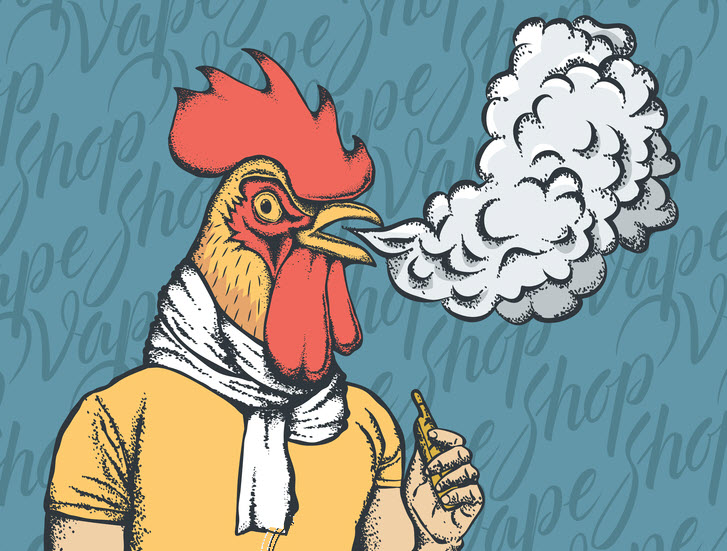
Why stoned chickens sell for more money on the open market
Stoned chickens sell for more
How stoned is your chicken?
And no… that’s not a reference to tails… or maybe it is?
Recently, Insider published an article reporting on a medical marijuana farm in Thailand’s newly established marijuana industry, which is feeding its chickens cannabis instead of antibiotics. Therefore, those looking for organic poultry are willing to pay a higher price for the meat.
Researchers from Chiang Mai University’s Department of Animal and Aquatic Sciences said less than 10% of the 1,000 chickens at the Lampang farm have died since they introduced marijuana to the chickens’ diets in January 2021. Insider.com
The experiment of feeding chickens cannabis instead of antibiotics aims to offer a solution for consumers who don’t want hormone-filled, antibiotic chickens as a meal. In fact, people who bought these chickens say the “meat tastes better and is more tender.”
The birds are fetching twice the regular price — about $1.50 a pound — mainly because buyers want organic chickens that haven’t been given antibiotics, Lumsangkul said. She also claimed that the meat from the chickens – which they call “ganja chicken” – is more tender and tastes better than regular chickens. – Insider.com
This could be because they aren’t pumping these chickens with hormones to make them grow faster, which allows the chicken to naturally develop its muscles, cardiovascular system, etc. They call it “broiler chickens”.
Broilers raised in this way are said to reach ‘slaughter weight’ when they are only six or seven weeks of age, but the death toll is very high. The growth of unusually heavy bodies causes debilitating and painful skeletal deformities, and the overloading of the birds’ underdeveloped cardiopulmonary systems often causes heart failure before they are six weeks old. – Britannica.com
Unfortunately, I couldn’t find the “mortality rate” for factory farm chickens, making a comparison with GanjaChickens impossible. In all likelihood, the death rate per 1000 chickens is far higher, especially since the maturity schedule is also skewed.
Nonetheless, with a more conscious eating movement taking place around the world, people are no longer satisfied with the way the industry is raising and preparing their food. This is because most companies are focused on maximizing profits and care very little about the health and well-being of their consumers.
Some might say, “Certainly, Tyson and similar bodies are working on the highest regulatory practices in the industry,” but the fact of the matter is that these companies are always trying to do “the minimum that’s asked of them” to pass regulation.
This means that it is common practice to give chickens hormones and antibiotics. The need for antibiotics is also increasing in settings such as factory farming. The mere fact that factory farming is legal shows how little these companies care about you and how much they care about profit.
However, people are becoming aware of these practices and hence are opting for more organic options. With the cannabis industry in full swing, this could be a good opportunity for other farmers (non-corporate chicken producers) to switch to cannabis feed for their livestock.
Industrial hemp – that’s history!
Around the world, hemp-feeding was common practice until cannabis was banned. It helped produce healthy, strong cattle. Since the cannabis ban, however, hemp could no longer be fed. This could change in the near future as studies are currently being conducted to see how efficient and healthy hemp feed is for cattle.
“Industrial hemp is typically grown for the production of oil, seed, fiber and medicines,” said Michael Kleinhenz, assistant professor of beef production medicine. “While hemp varieties can be grown for a single or dual purpose, such as seed and fiber, post-harvest by-products of leaves, forage, and residual plant fiber remain. These by-products could serve as potential animal feed. Cellulosic plant material is the ideal species for utilizing these feeds in ruminants, particularly cattle.” – Source
The research group, made up of multidisciplinary professionals including; found pharmacologists, toxicologists, analytical chemists and horticultural experts;
“We have observed that the acidic cannabinoids like CBDA and THCA are more easily absorbed from the rumen than other non-acidic cannabinoid forms like CBD and CBG,” said Kleinhenz. “Now that we have found that some cannabinoids are readily taken up from the rumen, the next step is to examine the degradation profiles of these compounds in tissue and milk residues after animal feeding trials. The effects of cannabinoids on cattle are also unknown.”
As this article shows, there are many benefits to using hemp in feed;
Scientists believe hemp as cattle feed can benefit health and increase performance. Hemp seeds, for example, are rich in desirable fatty acids such as omega 3, omega 6, omega 9 and GLA. It is also very rich in proteins containing all the amino acids.
Hemp seeds are also high in fiber and support an animal’s digestive system. It is also a good source of minerals such as: copper, iron, boron, zinc, manganese, nitrogen and zinc. Hemp is given to animals in Colorado as a supplement via crushed seed meal, pellets, or oil. – SOURCE
In other words, there’s plenty of evidence that hemp may actually be something that can help improve the quality of our food.
In places like Colorado, they’ve already added hemp to the feed. However, it is important to understand that it is used as a supplement rather than a main meal. This is similar to the practice in Thailand as we have seen with the chickens.
“We added about 10 to 20 percent of our pelleted hemp to feed cattle and pigs,” says Pauli Roterdam of Endo Scientific, a hemp-based tincture company, and Audacious Farms, an urban organic farm in Denver, Colo. “Nobody should ever feed their animals only hemp. It’s an addition. What we’ve seen are healthier animals fetching 10 to 20 percent more at auction. Your coats look better. they weigh more. And that’s from four months on our hemp feed.” – TheHempMag.com
Researchers also believe it will be beneficial not only for soil but also for human health as we begin to reduce our need for antibiotics and hormones.
“We think we will establish even rarer cannabinoid content that brings waste and regenerative qualities back into the soil, adding more value to our animals, the soil and people by bringing hemp and CBD back into our diets, like it was 100 years ago,” says Roterdam.
Sticky bottom line
Ultimately, it seems that cannabis will not only revolutionize our health and well-being, but will also help revolutionize our diet. If you’re an organic farmer or just have a few chickens at home, try finding some hemp supplements and experimenting. At least some of your customers would be willing to pay more for their stoned chicken.
Well, what about you, are you looking forward to ganja chicken?
MORE ABOUT THAILAND’S CANNABIS PLANS, READ THIS..

ASIA’S QUIET CANNABIS RIDE – THAILAND LEGALIZES CULTIVATION AND EXPORT!

Post a comment: